All you need to know about Carpenter's Square - 5
 is another famous tricky move. Of course black needs to prevent this stone from getting home, but how? I will give the correct solution first, then explain why other options won't work.
is another famous tricky move. Of course black needs to prevent this stone from getting home, but how? I will give the correct solution first, then explain why other options won't work.
First of all,  is a good move. Its main purpose is to leave bigger eyespace in the corner to avoid killing shapes like Bulky Five.
is a good move. Its main purpose is to leave bigger eyespace in the corner to avoid killing shapes like Bulky Five.  attempts to make an eye in the corner to form Eye versus No Eye capturing race. But
attempts to make an eye in the corner to form Eye versus No Eye capturing race. But  is another tesuji. White has no choice but blocking at
is another tesuji. White has no choice but blocking at  (if playing at 6 instead, black plays 5 and the corner is in seki, thanks for the big eyespace).
(if playing at 6 instead, black plays 5 and the corner is in seki, thanks for the big eyespace).
Following the previous diagram, the conclusion is clearly 'connect-and-die' and black is unconditionally alive. Most textbooks only give this solution but let's analyse some other possibilities.
 is incorrect. Even if black can get
is incorrect. Even if black can get  (which appears to be a key point), the corner is simply a Bulky Five, because
(which appears to be a key point), the corner is simply a Bulky Five, because  has wasted valuable eyespace. If black plays 'a' instead of
has wasted valuable eyespace. If black plays 'a' instead of  white simply form an eye at
white simply form an eye at  to win.
to win.
 here doesn't work either.
here doesn't work either.  is good and with an eye white wins the race easily.
is good and with an eye white wins the race easily.
Can white do something else instead of  in the solution above? What if white tries
in the solution above? What if white tries  here? Black can live in seki. If you have been following the series closely, such shape should look quite familiar now (this shape is for example the same as Diagram 4.5 in Shape 4).
here? Black can live in seki. If you have been following the series closely, such shape should look quite familiar now (this shape is for example the same as Diagram 4.5 in Shape 4).
Since  in the Solution diagram is such a good move, can
in the Solution diagram is such a good move, can  occupy the spot first?
occupy the spot first?  is calm. It does not matter that white can form an eye here as long as black also gets any eye at 'a'. Please verify that black is still alive.
is calm. It does not matter that white can form an eye here as long as black also gets any eye at 'a'. Please verify that black is still alive.
To summarise, there is no ko involved in this shape. If black knows how to punish white's tricky move black can live unconditionally.
PREVIOUS | INDEX | NEXT

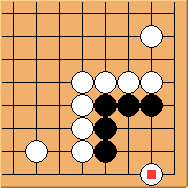
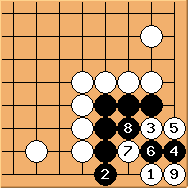
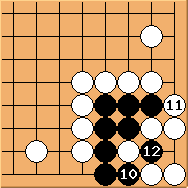
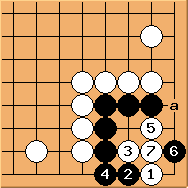
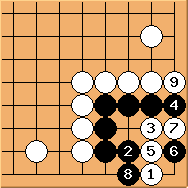
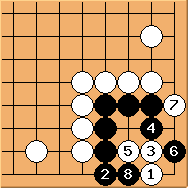
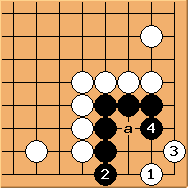
Comments
In Diagram 5.4, if B plays 'a
In Diagram 5.4, if B plays 'a' instead of 6, W can tenuki.